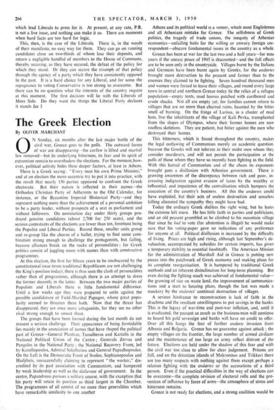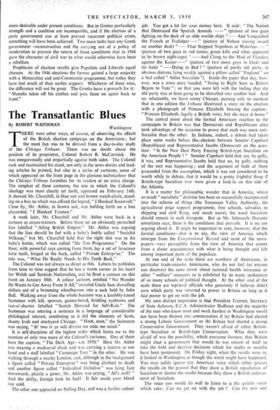The Greek Election
By OLIVER MARCHANT
0 N Sunday, six months after the last major battle of the civil war, Greece goes to the polls. The outward forms of war are disappearing—the curfew is lifted and martial law removed—but its underlying bitterness, its fear and its spirit of extremism remain to overshadow the elections. For the moment, how-
ever, political activity hides these deeper factors, at least in Athens.
There is a Greek saying: "Every man his own Prime Minister," and at an election the more eccentric try to put it into practice, with the result that nearly 150 parties appeared to confront the Greek electorate. But their nature is reflected in their names—the Orthodox Christian Party of Adherents to the Old Calendar, for instance, or the Byzantine Imperial Historical Party—and they represent nothing more than the achievement of a personal ambition to be a party leader, without prospects of a seat in parliament and without followers. On nomination day under thirty groups pro- duced genuine candidates (about 2,700 for 250 seats), and the serious contestants of the elections are fewer than ten, foremost being the Populist and Liberal Parties. Round these, smaller units group and re-group like the chorus of a ballet, trying to find some com- bination strong enough to challenge the protagonists, but failing, because alliances break on the rocks of personalities ; for Greek politics consist of juggling more with names than with constructive programmes.
At this election, the first for fifteen years to be unobscured by the constitutional issue (even traditional Republicans are not challenging the King's position today), there is thus seen the clash of personalities rather than of programmes, although there is an attempt to dress the former decently in the latter. Between the two major parties of Populists and Liberals there is little fundamental difference.
Until a few weeks ago they were prepared to unite against the possible candidature of Field-Marshal Papagos, whose great popu- larity seemed to threaten them both. Now that the threat has disappeared, they are once more antagonists, for they see no other rival strong enough to unseat them.
The groups that have been formed during the last month do not present a serious challenge. Their appearance of being formidable lies mainly in the association of names that have shaped the political past of Greece—General Plastiras, Tsoudheros and Kartalis in the National Political Union of the Centre ; Generals Zervas and Pangalos in the National Party ; the National Recovery Front, led by Kanellopoulos, Admiral Sakellariou and General Papadhopoulos. On the Left is the Democratic Front of Svolos, Sophianopoulos and Hadjibeis, unsuccessfully claiming to represent "the worker," dis- credited by its past association with Communism, and hampered by weak leadership as well as the disfavour of government. In the centre, Papandreou pursues a solitary course, with the exception that his party will retain its position as third largest in the Chamber. The programmes of all consist of no more than generalities which have remarkable similarity to one another Athens and its political world is a veneer, which most Englishmen and all Athenians mistake for Greece. The selfishness of Greek politics, the tragedy of trade unions, the inequity of Athenian economics—unfailing baits for the willing or unwary foreign cor- respondent—obscure fundamental issues in the country as a whole.
Greece has been at war for the last two and a half years—for nine years if the uneasy peace of 1945 is discounted—and the full effects are to be seen only in the countryside. Villages burnt by the Italians and Germans have been burnt again by Greeks, for the andartes brought more destruction to the peasant and farmer than to the enemies they claimed to be fighting. Seven hundred thousand men and women were forced to leave their villages, and round every large town in central and northern Greece today lie the relics of a refugee population—empty tents, mud houses patched with cardboard and crude shacks. Not all are empty yet, for families cannot return to villages that are no more than charred ruins, haunted by the bitter smell of burning. On the fringe of Larissa, in a cluster of mud huts, live the inhabitants of the village of Kali Pevka, transplanted from the slopes of Olympus, where their former homes are now roofless skeletons. They are patient, but bitter against the men who destroyed their homes.
This bitterness, which is found throughout the country, makes the legal outlawing of Communism merely an academic question, because the Greeks will not tolerate in their midst men whom they consider murderers, and will not permit the participation at the polls of those whom they have so recently been fighting in the field. With this hatred of Communism and of the chaos its exponents brought goes a disillusion with Athenian government. There is growing awareness of the discrepancy between rich and poor, in- creasing indignation against evasion of taxes by the wealthy or influential, and impatience of the centralisation which hampers the execution of the country's business. All this the andartes could have exploited, but their acts of useless destruction and senseless killing alienated the sympathy they might have had.
Today the ordinary Greek dislikes the right wing, but he hates the extreme left more. He has little faith in parties and politicians, and an old peasant grumbled as he climbed to his mountain village that since he had to vote (for abstention is illegal) he would make sure that his voting-paper gave no indication of any preference for anyone at all. Political disillusion is increased by the difficulty of living. Prices are high and rising, although last September's de- valuation, accompanied by subsidies for certain imports, has given a temporary stability to essential foodstuffs. The American Mission for the administration of Marshall Aid in Greece is putting new pieces into the patchwork of Greek economy and making plans for its complete reorganisation. It is hampered by traditional Greek methods and an inherent disinclination for long-term planning. But even during the fighting much was achieved of fundamental value— the growing of rice on waste land, the improvement of communica- tions and a start to housing plans, though the last was made a mockery by the tutelaries' continual destruction of villages.
A serious hindrance to reconstruction is lack of faith in the drachma and the resultant unwillingness to put savings in the banks. This is the legacy of war-time and post-war inflation, and, until it is eradicated, the peasant as much as the business-man will Continue to hoard his gold sovereign and banks will have no credit to offer. Over all this hangs the fear of further andarte invasion from Albania and Bulgaria. Greece has no guarantee against attack ; the empty villages on the frontier, the large number of armed civilians and the maintenance of too large an army reflect distrust of the future. Elections are held under the shadow of this fear and with the civil war too close to allow for clear judgement. Prisons are full, and on the detention islands of Makronisos and Trikkeri there are too many suspects with nothing against them except perhaps a relation fighting with the andartes or the accusations of a third person. Even if the practical difficulties in the way of elections can be overcome—the complete revision of electoral rolls and the pre- vention of-influence by force of arms—the atmosphere of stress and bitterness remains.
Greece is not ready for elections, and a strong coalition would be
more desirable under present conditions. But in Greece particularly strength and a coalition see incompatible, and if the election of a party government can at least prevent recurrent political crises, something will have been achieved. Two main tasks face any Greek government—reconstruction and the carrying out of a policy of moderation to prevent the return of those conditions that in 1946 gave the character of civil war to what would otherwise have been a rebellion.
Prophecies of election results give Populists and Liberals equal chances. At the 1946 elections the former gained a large majority with a Monarchist and anti-Communist programme, but today they have lost much of their earlier support. Whicheyer of them wins, the difference will not be great. The Greeks have a proverb for it: " Manolis takes off his clothes and puts them on again back to front."



































 Previous page
Previous page